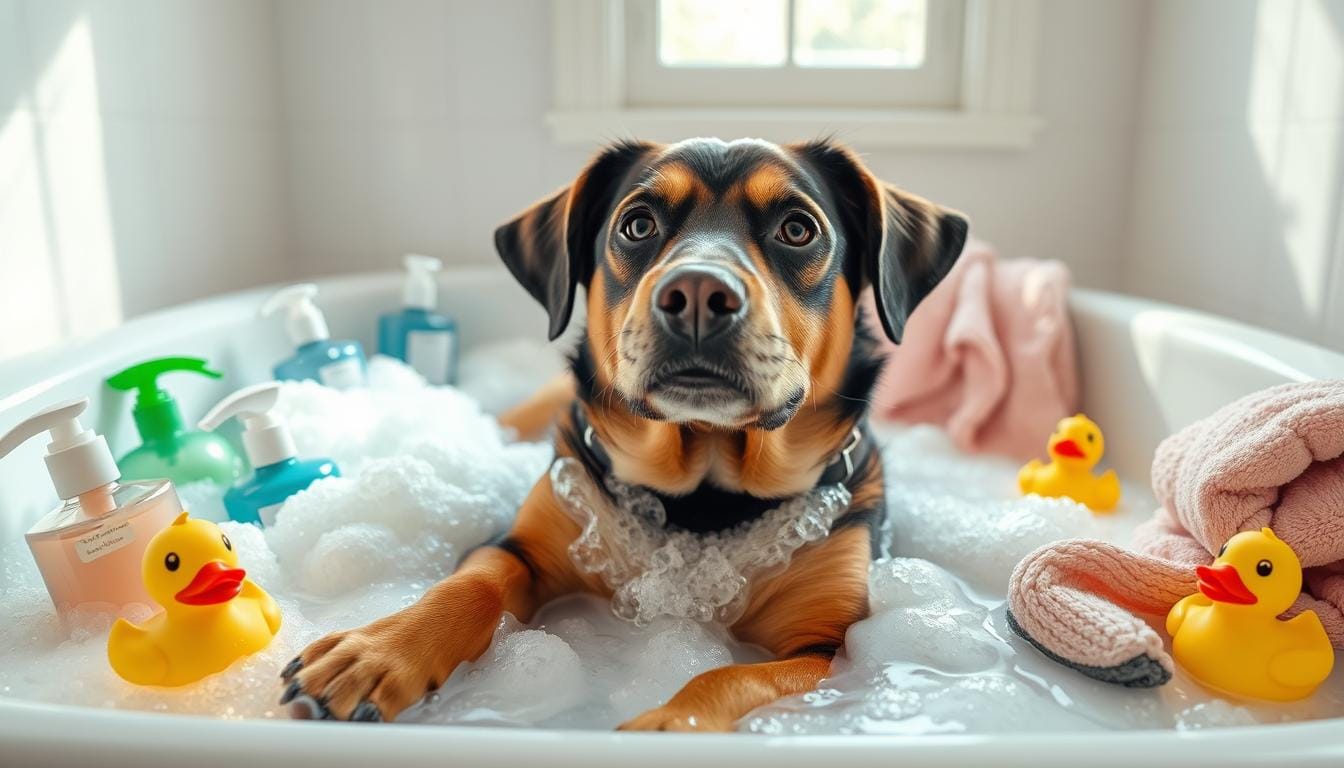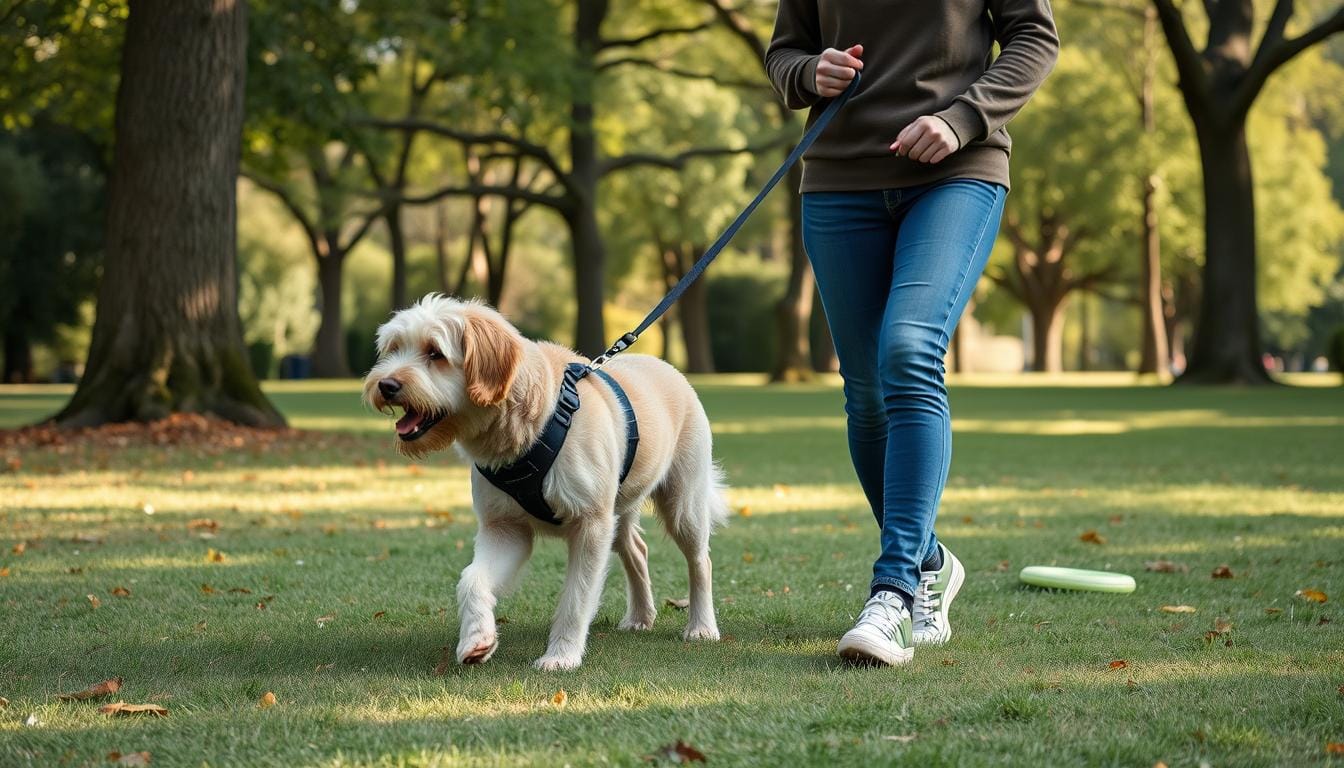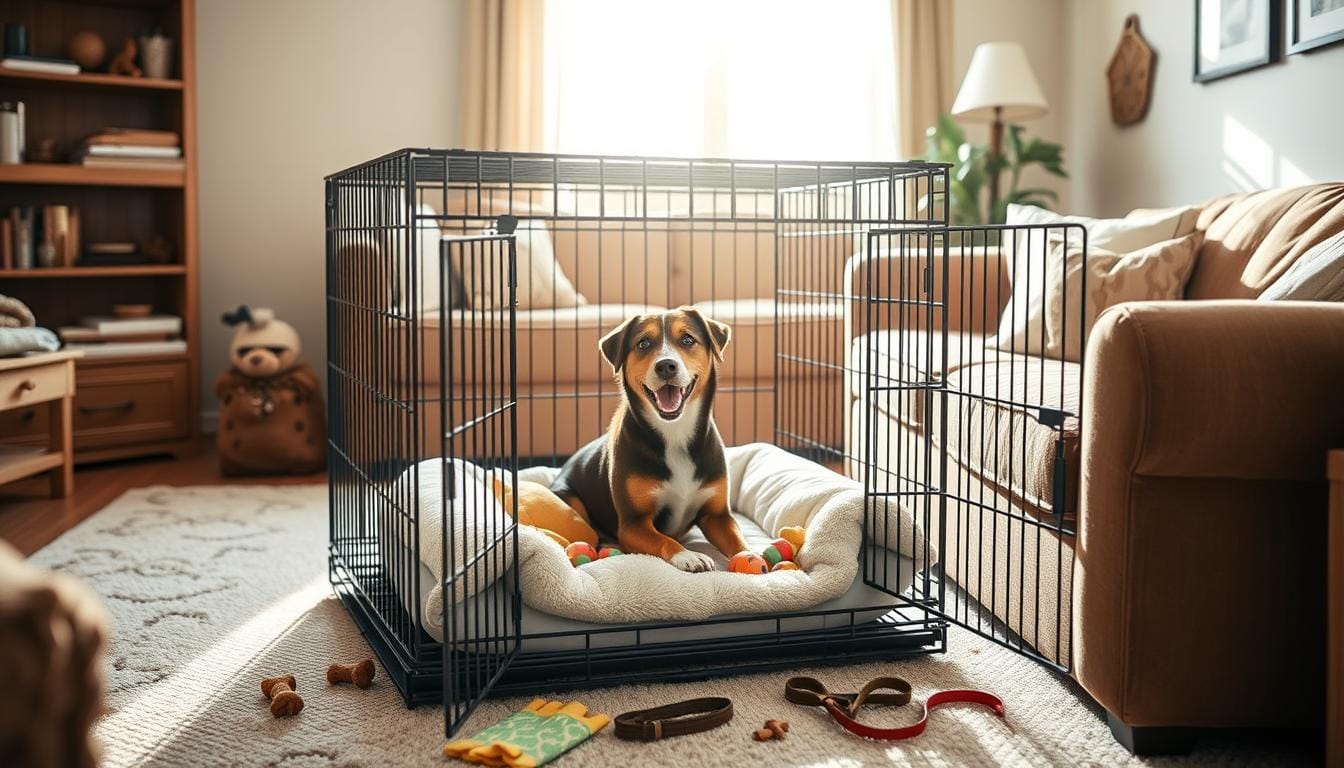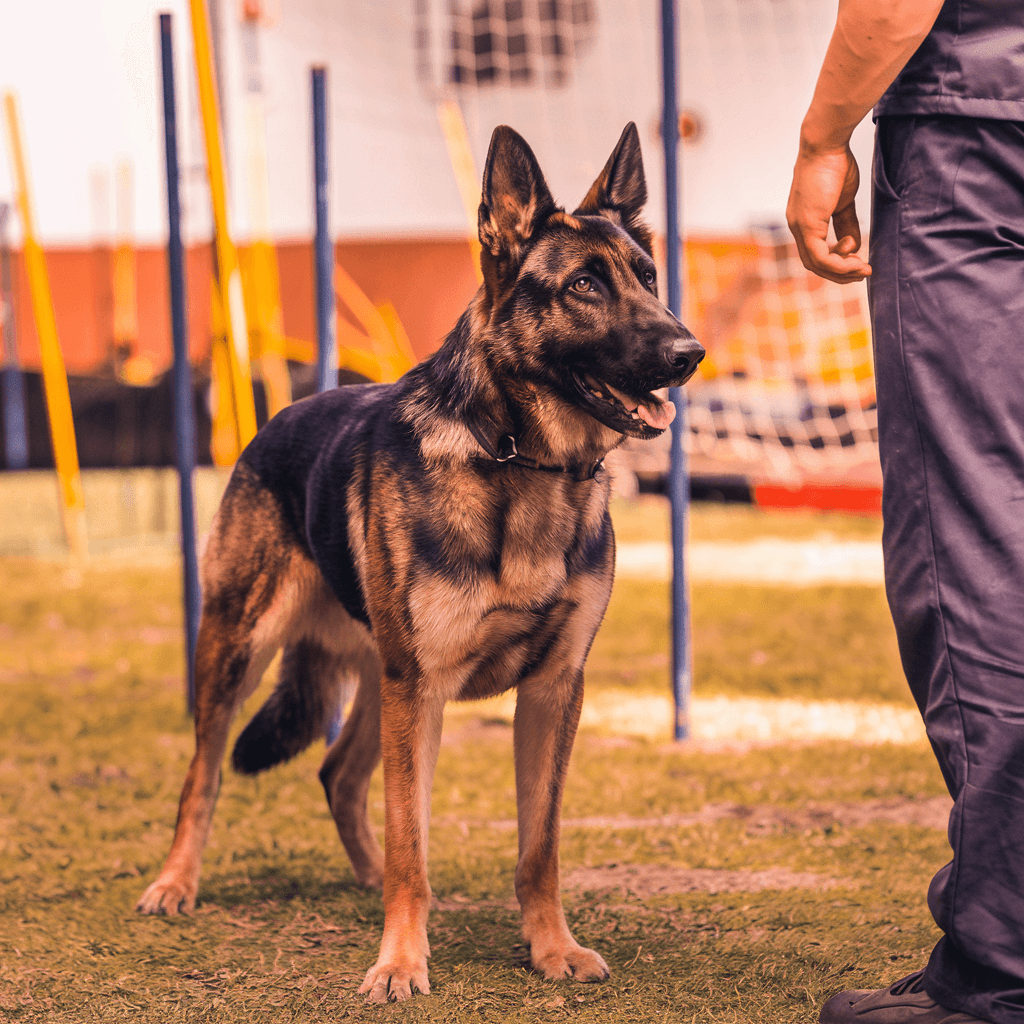Finding the right dog shampoo can be tough. With so many options, it’s key to pick the best for your dog. A healthy coat and good pet care start with the right shampoo.
Dogs have different skin pH levels than humans. Human shampoos can harm their skin. The right dog shampoo matches their skin’s pH, keeping their coat shiny and skin healthy.
When looking for dog grooming products, choose shampoos with natural ingredients. Oatmeal, aloe vera, and coconut oil soothe dry, itchy skin and make coats lustrous. Avoid shampoos with harsh chemicals, sulfates, or parabens to prevent skin irritation.
Different breeds have different grooming needs. Long-haired dogs might need detangling shampoos. Dogs with sensitive skin should use hypoallergenic options. For specific skin conditions, medicated shampoos from a vet can be very helpful.
Key Takeaways
- Choose dog-specific shampoos to match your pet’s skin pH
- Look for natural ingredients like oatmeal and aloe vera
- Avoid human shampoos and harsh chemicals
- Consider your dog’s breed and specific coat needs
- Consult a professional groomer for personalized advice
- Use hypoallergenic products for dogs with sensitive skin
- Medicated shampoos can help with specific skin conditions
Understanding Different Dog Coat Types
Dogs have many coat types, each needing special care. We’ll look at the main types and what grooming they need. This will help you pick the right products for your dog.
Single-Coated Breeds
Single-coated breeds have fur that’s close to their skin. Dogs like Beagles and Boxers need regular brushing. This removes loose hair and spreads natural oils. Knowing about different coat types is key for grooming. Use gentle shampoos to avoid dryness and irritation.
Double-Coated Breeds
Double-coated breeds, like Huskies and Golden Retrievers, have soft undercoats and harsher outer coats. They need good dog brushes to prevent matting and control shedding. They shed all year, with heavy shedding needing extra care.
Special Coat Considerations
Some breeds have special coat needs. Curly-coated dogs, like Poodles, need regular grooming to avoid tangles. Long-haired breeds might need de-tangling sprays. White-coated dogs could benefit from brightening shampoos to keep their coats looking clean.
| Coat Type | Grooming Frequency | Shedding Level | Special Care |
|---|---|---|---|
| Smooth | Every 8-12 weeks | Low | Dust-repelling products |
| Short | Weekly | Moderate | Regular brushing |
| Double | 2-3 times weekly | High | Undercoat rake |
| Long | Daily | Moderate to High | De-tangling sprays |
| Curly | Every 4-6 weeks | Low | Professional trimming |
By grooming your dog based on their coat type, you’ll keep their coat healthy and reduce shedding. Remember, regular brushing is essential for all coat types to keep your dog looking and feeling great.
Why Human Shampoo is Not Safe for Dogs
Dogs have special skin and coat needs that are different from humans. Using human shampoo on them can cause serious skin problems. It’s important to use dog-specific shampoos for their health.

Dogs and humans have different skin pH levels. Human skin has a pH of 5.5-5.6, while dog skin is between 6.2-7.4. This is why dog shampoos are made to match their skin’s natural pH.
Dogs have thinner skin than humans. Human skin has 10-15 layers, but dogs have only 3-5. This makes their skin more sensitive and prone to irritation. Using human shampoo can remove the natural oils that protect their skin, causing dryness, itching, and infections.
“Using the wrong shampoo on your dog can disrupt their skin’s natural balance and leave them vulnerable to skin issues.”
When looking for dog shampoo, choose products made for your pet’s needs. Many experts suggest using shampoos with natural ingredients that are gentle on their skin. Remember, proper grooming is key to your dog’s health and happiness.
Essential Ingredients in Quality Dog Shampoos
Choosing the right dog grooming products is key for a healthy coat. We’ve listed the must-have ingredients in top-notch dog shampoos.
Natural Moisturizing Agents
Natural moisturizers keep your dog’s skin and coat soft. Coconut oil and aloe vera are top picks. They moisturize deeply without making your dog’s coat greasy.
Beneficial Vitamins and Minerals
Good dog shampoos have vitamins for skin and coat health. Vitamin E makes fur shiny and easy to comb. B-complex vitamins keep the coat moist and healthy.
Soothing Botanical Extracts
Botanical extracts add extra benefits for your dog’s skin and coat. Oatmeal calms irritated skin, and lemongrass fights odors. Lavender makes bath time relaxing.
| Ingredient | Benefit |
|---|---|
| Neem Oil | Natural insect repellent, antibacterial properties |
| Aloe Vera | Soothes and hydrates skin |
| Oatmeal | Calms irritated skin, moisturizes |
| Chamomile | Anti-inflammatory, calming for sensitive skin |
| Coconut Oil | Strengthens hair follicles, deep moisturizing |
Look for dog grooming products that are pH-balanced and chemical-free. Choosing shampoos with these natural ingredients helps your dog’s skin and coat look great.
Dog grooming products, healthy coat, pet care tips
A well-groomed dog is a happy dog! Proper care is more than just bathing. Let’s look at some key grooming products and tips to keep your furry friend in top shape.
Dog conditioner is a must for a healthy, shiny coat. It detangles fur, reduces shedding, and keeps skin moist. It’s especially important for dogs with long or thick coats.
Now, let’s talk about dog nail clippers. Keeping your pup’s nails trimmed is key for their comfort and movement. Long nails can hurt and affect how they walk. Trim their nails every 4-6 weeks, or more often if needed.
Don’t overlook dog ear cleaning! It’s crucial for preventing infections, especially in dogs with floppy ears. Use a gentle, vet-approved cleaner to clean their ears weekly or bi-weekly.
- Brush short-haired breeds 1-2 times a week
- Medium-haired dogs need brushing 2-3 times weekly
- Long-haired breeds require daily brushing
- Bathe your dog every 4-6 weeks
Regular grooming sessions are great for bonding with your pet. They also help spot any skin problems. By using these products and practices, you’ll keep your dog healthy, comfortable, and looking great!
Types of Specialized Dog Shampoos
Choosing the right dog shampoo is key for pet care. Different dogs need different things, and special shampoos meet these needs.
Medicated Shampoos
Vet-recommended medicated dog shampoos tackle specific skin problems. They come in anti-itch, anti-fungal, and hot spot relief formulas. For dogs with flea or tick issues, these shampoos can help prevent or treat them.
Hypoallergenic Options
Dogs with sensitive skin do well with hypoallergenic shampoos. These gentle formulas clean without drying out the skin or making it worse. Look for oatmeal and aloe vera for their calming effects.
Anti-Shedding Formulas
Anti-shedding shampoos are great for breeds that shed a lot. They often have omega-3 or omega-6 fatty acids to keep the coat healthy and reduce shedding. Earth Rated has a 3-in-1 shampoo that cleans, conditions, and moisturizes, perfect for curly-coated dogs or those with mats.
Puppy-Specific Products
Young dogs need extra care. Puppy shampoos are made to be gentle, nourishing, and hydrating for their sensitive skin. They avoid harsh chemicals like sulfates, parabens, or artificial fragrances that could irritate a puppy’s skin.
Remember, the right dog shampoo depends on your pet’s specific needs. Always talk to your vet to find the best shampoo for your dog’s coat type and skin condition.
Identifying Your Dog’s Specific Needs
Choosing the right dog grooming products starts with understanding your furry friend’s unique requirements. Every dog has different needs based on their coat type, lifestyle, and health conditions. By tailoring your approach, you can ensure a healthy coat and happy pup.
Coat types vary widely among breeds. Short-haired dogs shed year-round but need less frequent brushing. Medium-coated breeds might require brushing every other day to prevent matting. Long-coated dogs, like Afghan Hounds, need daily grooming to avoid tangles.

Consider your dog’s lifestyle when selecting grooming tools. Active dogs might need more frequent baths with deep-cleaning shampoos. Dogs with skin folds may benefit from antibacterial formulas. If your pup has allergies, look for soothing ingredients like oatmeal or aloe vera.
| Coat Type | Grooming Frequency | Recommended Products |
|---|---|---|
| Short | Occasional baths | Shedding control shampoo |
| Medium | Brush every other day | Detangling spray |
| Long | Daily brushing | Moisturizing conditioner |
| Curly | Regular trims | Curl-enhancing products |
Remember, bathing too often can strip natural oils. Most dogs only need baths every 6-8 weeks unless they get particularly dirty. Always use dog-specific shampoos, as human products can harm their skin. By addressing your dog’s specific needs, you’ll keep their coat healthy and lustrous.
How Often to Bathe Your Dog
Finding the right bathing schedule for your dog is key to their health and cleanliness. Most dogs do well with weekly grooming. But, the need for full baths can change a lot. Let’s look at what affects how often you should bathe your dog.
Breed-Specific Guidelines
The breed and coat of your dog are big factors in bath frequency. Big dogs and those with long coats often need more grooming. Short-coated breeds might not need baths as often. Dogs with thick coats might need baths more to control shedding.
Lifestyle Factors
Your dog’s lifestyle and where they live also matter. Dogs that love the outdoors or get dirty a lot might need more baths. Swimming dogs might not need baths as often because swimming cleanses them.
| Lifestyle | Recommended Bathing Frequency |
|---|---|
| Active outdoor dogs | Every 2-4 weeks |
| Indoor pets | Every 4-6 weeks |
| Swimming dogs | As needed, with regular rinses |
Seasonal Considerations
Seasons change your dog’s bathing needs. Warmer months mean more baths because of more outdoor time and skin allergies. Winter might mean fewer baths to keep their skin’s natural oils from getting dry.
Too many baths can dry out your dog’s skin, while too few can cause health issues. Always use dog-specific shampoos and talk to your vet for advice. With the right grooming products and schedule, your dog will stay clean, healthy, and happy all year.
Avoiding Harmful Ingredients
When picking a dog shampoo, we must watch out for harmful ingredients. Many common chemicals can be very risky for our pets. For example, isopropyl alcohol can make a dog’s skin more open to other harmful substances.
Parabens, used as preservatives, can mess with a dog’s hormones. Triclosan, an antibacterial, can lead to more allergies and affect the endocrine system. Even petrolatum, a common moisturizer, is known to cause cancer.
Here’s a list of ingredients to avoid in dog shampoos:
- MEA, DEA, and TEA (ethanolamine compounds)
- Phthalates
- Sulfates (e.g., Sodium Lauryl Sulfate)
- Synthetic fragrances
- Mineral oil
- GMOs
- Silicones
- Synthetic dyes
- Petrochemicals
- Phenoxyethanol
As pet owners, we should always check labels. Choose dog shampoos with natural, plant-based ingredients. Quality pet care means knowing what we apply to our dogs’ skin and coat.
“The best dog shampoo is one that cleans effectively without compromising your pet’s health.”
By picking safe, high-quality dog shampoos, we keep our pets clean, healthy, and happy. Always talk to a vet if you’re not sure about a product’s safety for your pet.
Natural vs Chemical-Based Shampoos
Choosing between natural and chemical-based shampoos is key for your dog’s coat health. Natural shampoos are gentler and may offer health benefits.
Benefits of Organic Options
Organic dog shampoos have many benefits. They’re made without harmful chemicals. Even though they might be pricier, they can improve your dog’s skin and coat health in the long run.
Pride+Groom is the first dog grooming brand under a beauty platform. It uses essential oils in its products. Doglyness, on the other hand, has over 98% natural ingredients, with 25% being organic. These natural products can help keep your dog’s coat thick and shiny.
Understanding pH Balance
The pH balance of dog shampoos is important for skin health. Dogs need shampoos with a pH between 6.5 and 7.5. Chemical shampoos can upset this balance, causing skin problems.
- Chemical shampoos can cause skin irritation and itchiness
- Parabens in some products may increase cancer risk
- Silicones in commercial conditioners can lead to long-term skin problems
Natural dog grooming products help keep the immune system strong. They protect the skin from harmful chemicals. This prevents allergies and skin conditions. Choosing natural products ensures your dog stays healthy and well.
Professional Groomer Recommendations
Professional groomers share great tips for dog grooming products and pet care. They help keep your furry friend’s coat looking its best.
Quality tools are key for good grooming. Get durable clippers for all coat types. Slicker brushes with fine pins are best for medium to long coats. They remove tangles and loose fur, keeping the coat healthy.
Choosing the right shampoo is important, say groomers. Pick a pet-specific shampoo that meets your dog’s needs, like for allergies or dry skin. Make sure to rinse well to avoid skin irritation.
High-velocity dryers make drying faster and more comfortable for pets. Start introducing puppies to baths slowly to make grooming a positive experience.
| Essential Grooming Tools | Purpose |
|---|---|
| Quality Clippers | Trim hair on various coat types |
| Slicker Brushes | Remove tangles and loose fur |
| High-Velocity Dryer | Efficient and comfortable drying |
| Pet-Specific Shampoos | Address unique skin and coat needs |
Groomers say regular brushing is crucial. It spreads natural oils, prevents matting, and cuts down on shedding. By following these tips, your dog’s coat will stay healthy and beautiful.
Conclusion
Choosing the right dog shampoo is key for a healthy coat and good pet care. We looked at important factors like coat types and specific needs. Quality shampoos use natural ingredients to keep skin healthy and the coat shiny.
Regular grooming is vital for your pet’s health. For example, long-coated breeds like Afghan Hounds need regular grooming to avoid mats. Short-coated dogs, like Pointers, do well with bristle brushes to spread natural oils. Remember, human shampoos are not safe for dogs because of pH level differences.
When picking a dog shampoo, think about medicated or hypoallergenic formulas if your dog needs them. Stay away from harmful ingredients and choose natural or organic options if you can. By following these tips and picking the right shampoo, your dog will have a healthy, shiny coat and great skin health.
















